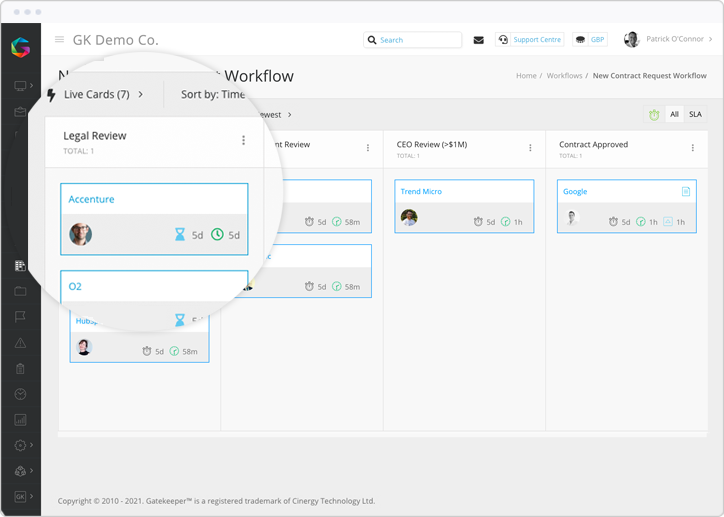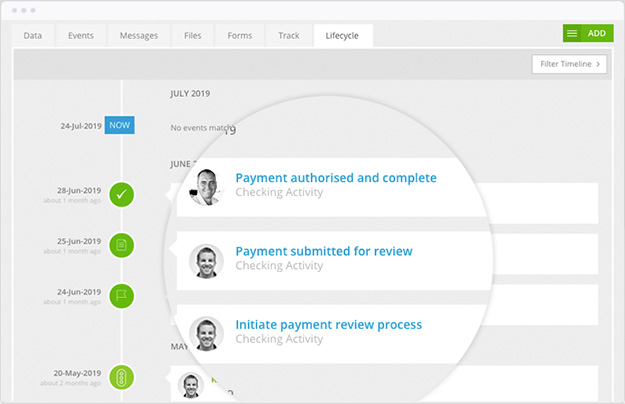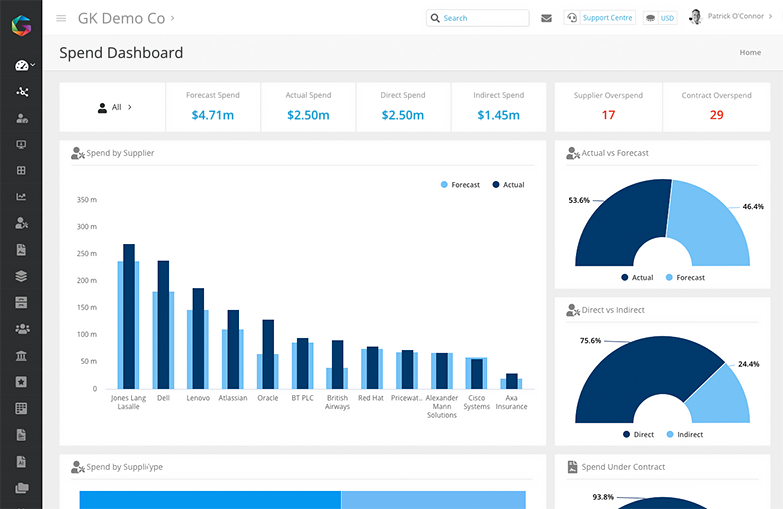

Today’s in-house legal teams are expected to do more with less: manage contracts, deliver legal support, protect the business and deliver greater value without increasing headcount and overheads. To help alleviate this increasing pressure, many businesses are introducing Legal Operations functions to optimise processes, maximise productivity and minimise costs.
Drawing on non-legal expertise, this function operationalises the Legal team, equipping it with the right technology and processes so it has greater capacity to better manage risk, monitor compliance and protect the business."
Some of the core competencies a Legal Operations function should aspire to, as outlined by CLOC, include:
In this article, we explore how implementing CLM software can help Legal Ops to build these competencies, whilst supporting Legal teams and the wider business.
Legal Ops teams have a crucial role to play in scaling businesses. As the legal department sees its workload increase alongside growth, Legal Ops has a responsibility to ensure growth doesn’t slow down time-to-contract or create unnecessary costs.
Unless growth is sustainable and the right technology is introduced at the right time, bottlenecks, increased organisational risk and hidden costs can quickly occur.
Research from Gartner reveals that 25%–40% of a lawyer’s time is spent on tasks that don’t require a lawyer, resulting in $2.7 million in lost productivity per year at a typical organisation.'
By introducing CLM software to the organisation, Legal Operations can equip in-house lawyers with technology that automates manual tasks, optimises internal processes and gives back valuable time to the team.
This increases Legal’s capacity, gives them time to focus on high-level goals such as resolving litigation issues and ensures they can effectively perform their role. Contract management software can be used to automate tasks such as:
Gatekeeper’s unique Kanban Workflow Engine provides visual cards that allow Legal Ops professionals to map out internal processes, gain immediate visibility into the workload of each lawyer and identify bottlenecks.
Auto-actions can be used to automate individual tasks or entire workflows, depending on how much Legal input is needed.
Legal Ops can also leverage contract automation and workflow data to provide meaningful insights to the leadership team. Whether it’s time-to-contract, how much time is spent on negotiation or how long Legal takes to review a contract and why, opportunities can be identified for new efficiencies.
 Automate legal processes & allow teams to focus on high-value activities
Automate legal processes & allow teams to focus on high-value activities
Gatekeeper helped us to automate a lot of processes around contract management and now we can use the time for something more interesting than endless email exchanges. It's also helping us to track and optimize the workload of each lawyer - which I would say is personally for me is the ultimate goal in every legal ops process.' - Anastasiia Sergeeva, Legal Operations Manager, BlaBlaCar
In some organisations, contract management doesn’t extend beyond the Legal team. Perceived as the main stakeholder for the entire lifecycle, in-house lawyers spend hours meticulously extracting key metadata, updating records in line with new legislation or regulations and sending agreements.
Overloaded with day-to-day management such as searching for contracts, in-house lawyers may find it difficult to step back and assess potential risks in their organisation.'
Expiring certificates, incomplete vendor records, agreements reaching their expiry date and information in the wrong hands can all cause disruption to the business, with legal teams left facing consequences for any non-compliance and security breaches.
This in turn can increase workload for already over-stretched teams as they are faced with fresh legal disputes that require a swift resolution.
Legal Operations can lead risk mitigation strategies throughout the organisation by implementing a CLM software that centralises and secures key information.'
Providing a single source of truth, Legal Ops can save internal teams time by giving them visibility of the contracts they need to prioritise based on key dates and events.
Combined with automatic notifications to stakeholders when attention is required, Legal teams can focus on dealing with matters of the law - rather than chasing stakeholders for input.
Legal Ops should also seek to put in processes surrounding information security throughout the organisation itself. Providing a solution that has Role-Based Access Controls (RBAC) and permissions can ensure that information meant for the legal team only can be kept that way. This helps to prevent data loss and breaches.
The selected technology should also support processes for handover in the event that a member of the legal team leaves. CLM software allows contracts and documents to be reassigned from a user, before the user is archived within the system.
This prevents any knowledge gaps occurring, protects the knowledge transfer and ensures that the legal team can continue to operate seamlessly and risk-free.
 Build a complete and auditable history of contract activity to support compliance
Build a complete and auditable history of contract activity to support compliance
Gatekeeper not only provides information security, document management and centralised visibility. It also creates an auditable history of every action taken against a record, when it happened and who owned it. With this information, Legal Ops can provide leadership with granular insights into information governance.'
In-house counsels using manual processes to manage their daily workload can be easily overwhelmed with tasks that sit outside of their specialism. Whether it’s extracting key data from agreements, chasing third-parties for up-to-date information or looking for information, Legal teams can find themselves facing multiple barriers that prevent them from delivering legal services and advice.
Research from McKinsey reveals that employees spend 1.8 hours every day – 9.3 hours per week, on average – searching and gathering information.'
For every hour that an in-house lawyer is paid to look for a contract or specific clause, for example, spend is also allocated to external counsels for legal services delivery. Legal Operation functions are responsible for making cost savings by enabling the legal department to maximise capacity so external hires aren’t required.
To achieve this, Legal Operations requires insight into the spend dedicated to internal and external counsel - whether that’s cost per contract, the number of billable hours per legal employee or the ratio of billed hours compared to non-billable hours worked.
CLM software helps Legal Ops and Finance work collaboratively with data-driven dashboards that visualise spend data. Legal Ops can drill down into actual spend vs forecast spend for the legal department, identify areas of consolidation and take control of external hires that drive costs up of the entire team.
 Identify Legal cost savings with Gatekeeper's Spend Dashboard
Identify Legal cost savings with Gatekeeper's Spend Dashboard
Gatekeeper allows Legal Ops leads to categorise external counsel as a Supplier Type, so financial information can be easily accessed through the Spend Dashboard. Visibility of how much is being spent, and where, can help Legal Ops to consolidate external costs and justify any additional spend on increasing internal headcount if it’s required.'
The purpose of the Legal Operations function is to ensure that the in-house legal team can perform to the best of its ability. Among other key tasks, Legal Ops need to implement the right technology to ensure that the legal team can run to capacity while focusing only on its area of expertise - delivering legal services.
Manual processes, managing spend on external counsel and increasing workloads as businesses scale are all barriers that the Legal Ops function is designed to overcome.'
Process optimisation and financial management are pivotal within this role, so selecting the best technology is crucial. Not only will it benefit the Legal Ops function, but it will better serve the legal team who can then focus on higher-value work for the business.
If you’re ready to learn more about why your Legal Ops team should choose CLM software, contact us or book a demo today.
Ready to improve your contract & vendor management?
.png)
.png)
.png)
-4.png)
Before Gatekeeper, our contracts
Anastasiia Sergeeva, Legal Operations Manager, BlaBlaCar
were everywhere and nowhere.
Gatekeeper is that friendly tap on the shoulder,
Donna Roccoforte, Paralegal, Hakkasan Group
to remind me what needs our attention.
Great System. Vetted over 25 other systems
Randall S. Wood, Associate Corporate Counsel, Cricut
and Gatekeeper rose to the top.
Thank you for requesting your demo.
Next Step - Book a Call
Please book a convenient time for a quick call to discuss your requirements.